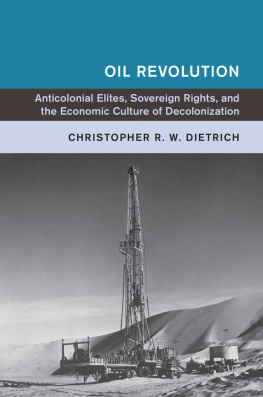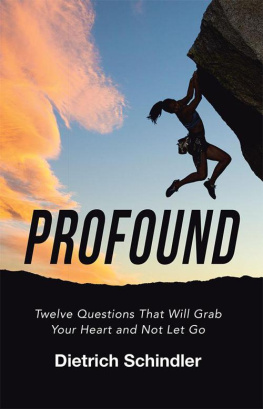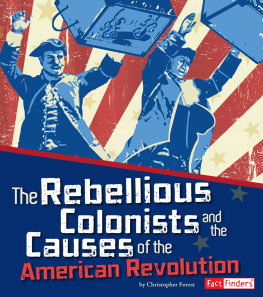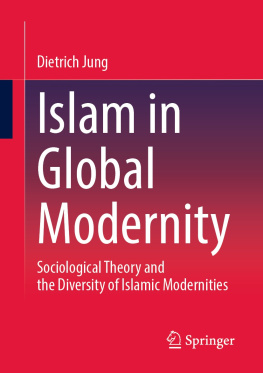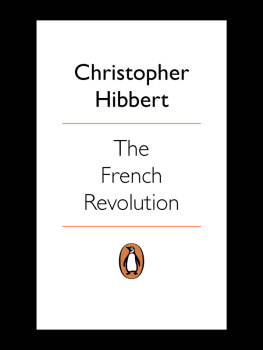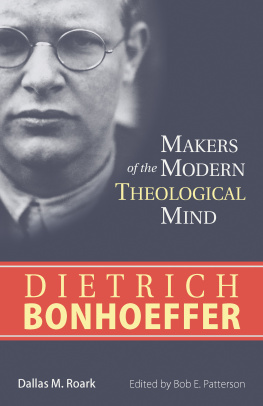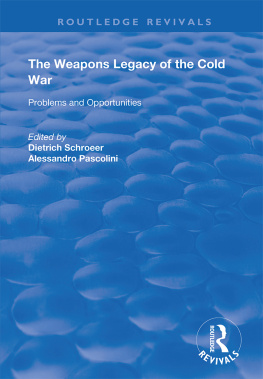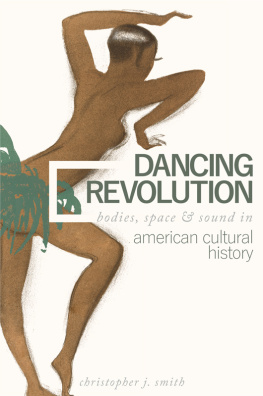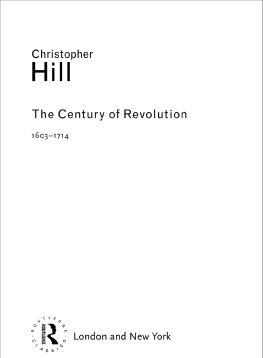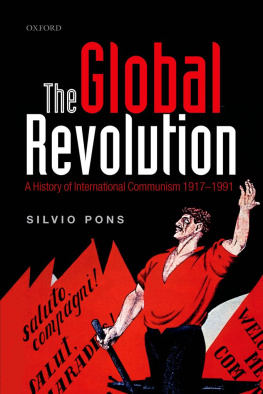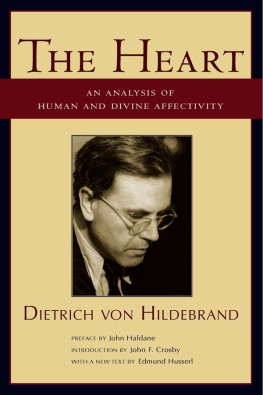Christopher R. W. Dietrich - Oil Revolution (Global and International History)
Here you can read online Christopher R. W. Dietrich - Oil Revolution (Global and International History) full text of the book (entire story) in english for free. Download pdf and epub, get meaning, cover and reviews about this ebook. year: 2017, publisher: Cambridge University Press, genre: Politics. Description of the work, (preface) as well as reviews are available. Best literature library LitArk.com created for fans of good reading and offers a wide selection of genres:
Romance novel
Science fiction
Adventure
Detective
Science
History
Home and family
Prose
Art
Politics
Computer
Non-fiction
Religion
Business
Children
Humor
Choose a favorite category and find really read worthwhile books. Enjoy immersion in the world of imagination, feel the emotions of the characters or learn something new for yourself, make an fascinating discovery.
- Book:Oil Revolution (Global and International History)
- Author:
- Publisher:Cambridge University Press
- Genre:
- Year:2017
- Rating:4 / 5
- Favourites:Add to favourites
- Your mark:
- 80
- 1
- 2
- 3
- 4
- 5
Oil Revolution (Global and International History): summary, description and annotation
We offer to read an annotation, description, summary or preface (depends on what the author of the book "Oil Revolution (Global and International History)" wrote himself). If you haven't found the necessary information about the book — write in the comments, we will try to find it.
Oil Revolution (Global and International History) — read online for free the complete book (whole text) full work
Below is the text of the book, divided by pages. System saving the place of the last page read, allows you to conveniently read the book "Oil Revolution (Global and International History)" online for free, without having to search again every time where you left off. Put a bookmark, and you can go to the page where you finished reading at any time.
Font size:
Interval:
Bookmark:
Oil Revolution
Through innovative and expansive research, Oil Revolution analyzes the tensions faced and networks created by anticolonial oil elites during the age of decolonization following World War II. This new community of elites stretched across Iran, Iraq, Saudi Arabia, Venezuela, Algeria, and Libya. First through their western educations and then in the United Nations, the Arab League, and the Organization of Petroleum Exporting Countries, these elites transformed the global oil industry. Their transnational work began in the early 1950s and culminated in the 1973 to 1974 energy crisis and in the 1974 declaration of a New International Economic Order in the United Nations. Christopher R. W. Dietrich examines how these elites brokered and balanced their ambitions via access to oil, the most important natural resource of the modern era.
Christopher R. W. Dietrich is Assistant Professor of History at Fordham University. He has been awarded fellowships from the Woodrow Wilson Foundation, the American Historical Association, the National History Center, Yale University, the University of Texas at Austin, and the Society for Historians of American Foreign Relations.
Erez Manela, Harvard University
John McNeill, Georgetown University
Aviel Roshwald, Georgetown University
The Global and International History series seeks to highlight and explore the convergences between the new International History and the new World History. Its editors are interested in approaches that mix traditional units of analysis such as civilizations, nations and states with other concepts such as transnationalism, diasporas, and international institutions.
Oil Revolution
Anticolonial Elites, Sovereign Rights, and the Economic Culture of Decolonization
Christopher R. W. Dietrich
Fordham University


University Printing House, Cambridge CB 2 8 BS , United Kingdom
One Liberty Plaza, 20th Floor, New York, NY 10006, USA
477 Williamstown Road, Port Melbourne, VIC 3207, Australia
4843/24, 2nd Floor, Ansari Road, Daryaganj, Delhi 110002, India
79 Anson Road, #0604/06, Singapore 079906
Cambridge University Press is part of the University of Cambridge.
It furthers the Universitys mission by disseminating knowledge in the pursuit of education, learning, and research at the highest international levels of excellence.
www.cambridge.org
Information on this title: www.cambridge.org/9781107168619
DOI : 10.1017/9781316717493
Christopher R. W. Dietrich 2017
This publication is in copyright. Subject to statutory exception and to the provisions of relevant collective licensing agreements, no reproduction of any part may take place without the written permission of Cambridge University Press.
First published 2017
Printed in the United States of America by Sheridan Books, Inc.
A catalogue record for this publication is available from the British Library.
ISBN 978-1-107-16861-9 Hardback
ISBN 978-1-316-61789-2 Paperback
Cambridge University Press has no responsibility for the persistence or accuracy of URLs for external or third-party Internet Web sites referred to in this publication and does not guarantee that any content on such Web sites is, or will remain, accurate or appropriate.
For Vernica
What in short is the truths cash-value in experiential terms?
Morris Zapp, the antihero of David Lodges novel Small World , provides some insight into one academic neurosis: Scholars these days are like the errant knights of old, wandering the ways of the world in search of adventure and glory. The quixotic sentence drips with irony, especially when uttered by such a notorious pedant. Delusions of grandeur aside, scholars are rarely thrill-seekers or glory-mongers. But Lodges mockery of his character becomes poignant at the center of the sentence when, in the swift transition from simile to explanation, he lets Zapp utter truth. Scholarship requires one to wander and the wandering is often errant.
The generosity of the History Department and College of Liberal Arts at Fordham University, the History Department and the Institute for Historical Studies at the University of Texas at Austin, International Security Studies at Yale University, the Society for Historians of American Foreign Relations, the American Historical Association, and the National History Center allowed for long research trips, dedicated writing time, and errant wandering.
Others have made my research less errant. Archivists and librarians helped track down documents at a number of institutions: the OPEC library, the Bodleian Special Collections at Oxford, the Manuscripts Division of the Library of Congress, the OECD archives, the IMF archives, and the UN archives and libraries in New York and Geneva. In addition, I thank the staff at the National Archives of the United States, the National Archives of the United Kingdom, and the Johnson, Nixon, and Ford presidential libraries. The Inter-Library Loan staff at Fordham also merits my deep gratitude.
Fordham University provided funds to workshop an early version of this book, for which I am thankful. This book has also benefited from discussions at the Columbia Seminar on Twentieth Century Politics and Society, Yale International Security Studies, the Institute for Historical Studies at the University of Texas at Austin, the Cold War Seminar and Remarque Institute at New York University, the European University Institute, the Ramapo College Global Studies Colloquium, the International and Comparative Law Center at Mississippi College, the Decolonization Seminar of the National History Center, and many annual meetings of the Society for Historians of American Foreign Relations.
Benevolence characterizes my mentors and peers. Mark Lawrence and Michael Stoff of the University of Texas at Austin provided sage advice, sharp critical eyes, and good humor as advisers. They and other scholars encouraged me to tackle important issues with clarity. Thanks for that to Mark Bradley, Giuliano Garavini, Bob Vitalis, Monica Kim, Craig Daigle, Marilyn Young, Ryan Irwin, Laurie Green, David Painter, Jeremi Suri, David Oshinsky, Bill Brands, Amy Offner, Petra Goedde, Brandon Wolfe-Hunnicutt, Bevan Sewall, Anand Toprani, Nate Citino, Victor McFarland, Jeremy Friedman, Paul Kramer, Frank Gerits, Douglas Little, James Goode, Roham Alvandi, John Darwin, Jason Parker, Philippa Levine, Paul Chamberlin, Nick Cullather, Brad Simpson, Joshua Davis, Marc-William Palen, Brett Bennett, Renata Keller, Jonathan Hunt, Sarah Steinbock-Pratt, Emily Brownell, Rachel Hermann and Wm. Roger Louis. My colleagues at Fordham especially Asif Siddiqi, Kirsten Swinth, David Hamlin, Nicholas Paul, Maryanne Kowaleski, Mark Naison, Silvana Patriarca, Steven Stoll, Durba Mitra, Thierry Rigogne, Wolfgang Mueller, Saul Cornell, Susan Wabuda, Daniel Soyer, Sal Acosta, Doron Ben-Atar, Glenn Hendler, David Myers, Rosemary Wakeman, Carina Ray, and Michael Latham have been supportive and, more importantly, kind.
Next pageFont size:
Interval:
Bookmark:
Similar books «Oil Revolution (Global and International History)»
Look at similar books to Oil Revolution (Global and International History). We have selected literature similar in name and meaning in the hope of providing readers with more options to find new, interesting, not yet read works.
Discussion, reviews of the book Oil Revolution (Global and International History) and just readers' own opinions. Leave your comments, write what you think about the work, its meaning or the main characters. Specify what exactly you liked and what you didn't like, and why you think so.

